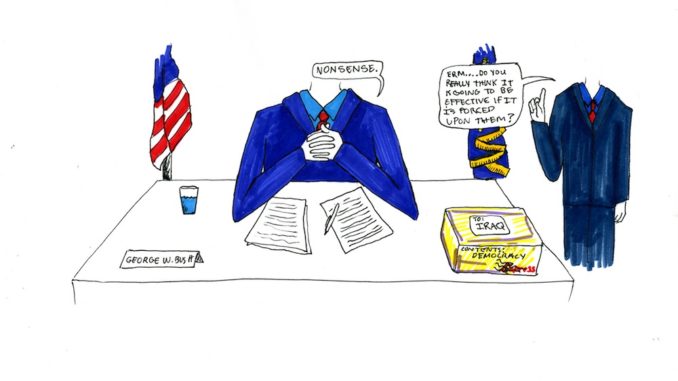
By Abdulrahman Al Rayyis
On May 12, 11 million Iraqis went to the ballot boxes to decide the future of a war-torn Iraq. After a few months, the new government is yet to be formed, making the Iraqi elections one of the longest elections in the world.
Democracy, the dream of every enlightened Iraqi, has become a bitter reality. The Iraqi democratic process is a powerhouse of bribes, fraud and corruption. This year, a record low level of participation, continued protests, attacks against ballot boxes, the continued threat of ISIL and a Kurdish call for independence made these elections especially important and decisive for future Iraqi politics.
This is the fourth election that has taken place since the American invasion of Iraq. It showed no difference from its predecessor: full of familiar faces and an unchanging political landscape. Politically, Iraq is divided into three main blocs: Sunni, Shia and Kurdish. These groups shape the government. In fact, it is uncommon for Iraqis to vote outside of their ethnic or religious groups regardless of the qualifications or the academic background of their political candidates. This brings one question to my mind, are the Iraqis worthy of democracy?
Current Iraq was formed as a result of the Ottoman Empire division by the British and French colonists back in the Sykes-Picot Agreement of May 1916, however, from its formation until 2004, the Iraqi public had no say in their politics. Regime change came through assassinations and coups, not ballot boxes. Therefore, the concept of democracy itself is relatively new to the Iraqi public. To make matters worse, the Iraqis did not pave their road to democracy; instead, it came served on a silver plate by the Americans who simply could not comprehend the complication of a sudden democratic shift in a country with a long history of dictators and ethnic persecution.
In Iraq, the Prime Minister must be of a Shia origin, the Parliament leader of a Sunni descent and the honorary position of the President goes to the Kurds. Such a division of power based solely on religion and ethnicity shows the immaturity of Iraq’s democracy. Lebanon, another struggling democracy, has a similar power structure. This division of power creates an unfair distribution of power to minorities and has led to the marginalization of many minorities such as the Christians, Mandawis and Yazidis. This has resulted in mass immigration and sectarian violence, particularly between 2006 and 2008.
Closely observing the Iraqi democracy is essential in understanding the aims and results of the American invasion of Iraq in 2003. The seeds of democracy planted by President Bush grew to be a failed democracy and the US appears to be only interested in keeping American-friendly leaders in power.
What Bush failed to understand is that destroying an autocracy does not automatically create a democracy, for the vision afterwards and the management of the power vacuum is the essential part in creating a successful democracy. The Iraqi democratic example is especially relevant to developing countries as it teaches an important lesson: democracy cannot be imposed, it must come within. The Iraqis are yet to experience a true democracy one that is homegrown and adaptable to the unique culture and history of Iraq.
Subscribe to the Mossy Log Newsletter
Stay up to date with the goings-on at Lewis & Clark! Get the top stories or your favorite section delivered to your inbox whenever we release a new issue.

Leave a Reply